Lieutenant Governor of Illinois
The lieutenant governor of Illinois is the second highest executive of the State of Illinois. In Illinois, the lieutenant governor and governor run on a joint ticket and are directly elected by popular vote. Gubernatorial candidates select their running mates when filing for office and appear on the primary election ballot together. When the governor of Illinois becomes unable to discharge the duties of that office, the lieutenant governor becomes acting governor. If the governor dies, resigns or is removed from office, the lieutenant governor becomes governor.[2][3] Under the Illinois Constitution, the Attorney General is next in line of succession to the Governor's office after the lieutenant governor, but does not succeed to the lieutenant governor's office. From the impeachment of Rod Blagojevich in 2009, until the inauguration of Sheila Simon in 2011, Attorney General Lisa Madigan would have become governor if Pat Quinn had vacated the office. Historically, the lieutenant governor has been from either the Democratic Party or Republican Party. The current lieutenant governor is Democrat Juliana Stratton.
| Lieutenant Governor of Illinois | |
|---|---|
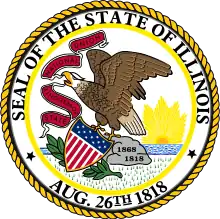 | |
| Government of Illinois | |
| Term length | 4 years, no term limits |
| Inaugural holder | Pierre Menard |
| Formation | 1818 |
| Salary | $139,200[1] |
| Website | www2 |
Prior to the 1970 Constitution, governors and lieutenant governors were separately elected.[4] The 1970 Constitution introduced joint elections for governor and lieutenant governor, though the candidates were nominated in separate primaries. Following the 1986 and 2010 elections, in which the Democratic nominees for Governor were forced to run with extreme or disfavored lieutenant-gubernatorial nominees, the Illinois General Assembly abolished the separate-primary requirement.[5] The 2014 gubernatorial election was the first one to take place in which gubernatorial and lieutenant gubernatorial candidates ran on the same ticket in the primary election.
Duties
The lieutenant governor of Illinois handles a variety of responsibilities which have been delegated to the office via statute. These duties include serving as Chairman of the Governor's Rural Affairs Council,[6] Chairman of Rural Bond Bank of Illinois, head of the Illinois Main Street Program, and Chairman of the Illinois River Coordinating Council.
In addition to these duties, the lieutenant governor can take on other duties as assigned by the governor or initiate duties of his or her own. An example of this is work by former Lt. Gov. Corrine Wood on women's health issues. The lieutenant governor also serves as a surrogate speaker for the governor around the state and as a representative for state government. The lieutenant governor is a member of the National Lieutenant Governors Association.
Prior to the adoption of the Illinois Constitution of 1970, the lieutenant governor also served as the president of the Senate. Losing this position made the lieutenant governor's job less significant, and contributed to the "boredom" cited by Jim Thompson's first lieutenant governor, Dave O'Neal, who resigned from the office in 1981.[7]
Under the Illinois state Constitution Article V section 7. "If the Lieutenant Governor fails to qualify or if his office becomes vacant, it shall remain vacant until the end of the term." Illinois thus had no lieutenant governor during the two-year interim between Pat Quinn's elevation to the governor's office upon Rod Blagojevich's impeachment conviction, and Sheila Simon's election and inauguration as lieutenant governor.
Like the governor, the lieutenant governor has suites of offices in both Springfield and Chicago.
Qualifications
The lieutenant governor of Illinois serves four-year terms. Inauguration takes place on the second Monday in January following a gubernatorial election. A lieutenant governor is
- required to be at least twenty-five years old,
- required to be a United States citizen,
- required to have been a resident of Illinois for the three years previous to election,
- barred from other government positions during the term.
List of lieutenant governors of Illinois
On three occasions, prior to a 1970 change to the state constitution, the lieutenant governor was of a different political party from the governor. In each instance a Democratic lieutenant governor served under a Republican governor. After the lieutenant governor comes the attorney general.
| # | Image | Lt. governor | Party | Commission date | End date | Governor | Party | Term |
|---|---|---|---|---|---|---|---|---|
| 1 |  |
Pierre Menard | Democratic-Republican | October 6, 1818 | December 5, 1822 | Shadrach Bond | Democratic-
Republican |
1818–1822 |
| 2 | Adolphus Hubbard | Democratic-
Republican |
December 5, 1822 | December 6, 1826 | Edward Coles | Democratic-
Republican |
1822–1826 | |
| 3 | William Kinney | Democratic | December 6, 1826 | December 9, 1830 | Ninian Edwards | Democratic-
Republican |
1826–1830 | |
| 4 |  |
Zadok Casey | Democratic | December 9, 1830 | March 1, 1833 | John Reynolds | Democratic | 1830–1834 |
| 5 | 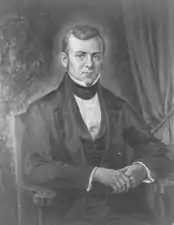 |
William Lee D. Ewing | Democratic | March 1, 1833 | December 5, 1834 | |||
| Office vacant: November 17 – December 5, 1834 | William Lee Davidson Ewing | Democratic | 1834 | |||||
| 6 | Alexander Jenkins | Democratic | December 5, 1834 | December 9, 1836
Resigned |
Joseph Duncan | Democratic | 1834–1838 | |
| 7 | William H. Davidson | Democratic | December 9, 1836
Acting |
December 7, 1838 | ||||
| 8 | Stinson Anderson | Democratic | December 7, 1838 | December 8, 1842 | Thomas Carlin | Democratic | 1838–1842 | |
| 9 | John Moore | Democratic | December 8, 1842 | December 9, 1846 | Thomas Ford | Democratic | 1842–1846 | |
| 10 | Joseph Wells | Democratic | December 9, 1846 | January 8, 1849 | Augustus C. French | Democratic | 1846–1853 | |
| 11 | William McMurtry | Democratic | January 8, 1849 | January 10, 1853 | ||||
| 12 |  |
Gustavus Koerner | Democratic | January 10, 1853 | January 12, 1857 | Joel Aldrich Matteson | Democratic | 1853–1857 |
| 13 | 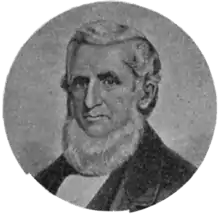 |
John Wood | Republican | January 12, 1857 | March 20, 1860 | William Henry Bissell | Republican | 1857–1860 |
| 14 | Thomas Marshall | Democratic | January 7, 1861 | January 14, 1861 | John Wood | Republican | 1860–1861 | |
| 15 | 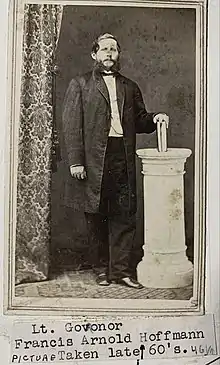 |
Francis Hoffmann | Republican | January 14, 1861 | January 16, 1865 | Richard Yates | Republican | 1861–1865 |
| 16 |  |
William Bross | Republican | January 16, 1865 | January 11, 1869 | Richard J. Oglesby | Republican | 1865–1869 |
| 17 | 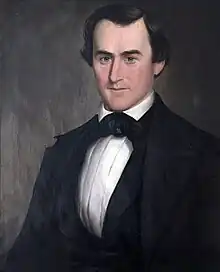 |
John Dougherty | Republican | January 11, 1869 | January 13, 1873 | John M. Palmer | Republican | 1869–1873 |
| 18 | .jpg.webp) |
John Lourie Beveridge | Republican | January 13, 1873 | January 23, 1873
Succeeded Oglesby |
Richard J. Oglesby | Republican | 1873 |
| 19 | 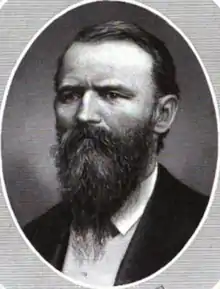 |
John Early | Republican | January 23, 1873
Acting |
January 8, 1875 | John Lourie Beveridge | Republican | 1873–1877 |
| 20 | Archibald Glenn | Democratic | January 8, 1875
Acting |
January 8, 1877 | John Lourie Beveridge | Republican | 1873–1877 | |
| 21 | .png.webp) |
Andrew Shuman | Republican | January 8, 1877 | January 10, 1881 | Shelby Moore Cullom | Republican | 1877–1883 |
| 22 | 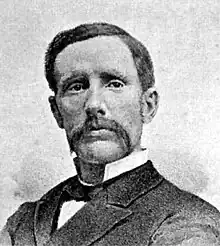 |
John Marshall Hamilton | Republican | January 10, 1881 | February 6, 1883
Succeeded Cullom | |||
| 23 | 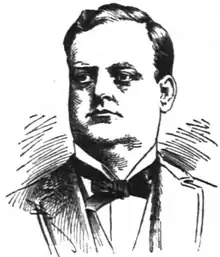 |
William J. Campbell | Republican | February 6, 1883
Acting |
January 30, 1885 | John Marshall Hamilton | Republican | 1883–1885 |
| 24 | _(14762787595).jpg.webp) |
John Smith | Republican | January 30, 1885 | January 14, 1889 | Richard J. Oglesby | Republican | 1885–1889 |
| 25 |  |
Lyman Ray | Republican | January 14, 1889 | January 10, 1893 | Joseph W. Fifer | Republican | 1889–1893 |
| 26 | Joseph B. Gill | Democratic | January 10, 1893 | January 11, 1897 | John Peter Altgeld | Democratic | 1893–1897 | |
| 27 |  |
William Northcott | Republican | January 11, 1897 | January 9, 1905 | John R. Tanner | Republican | 1897–1901 |
| Richard Yates | Republican | 1901–1905 | ||||||
| 28 | _(14781691365).jpg.webp) |
Lawrence Sherman | Republican | January 9, 1905 | January 18, 1909 | Charles S. Deneen | Republican | 1905–1913 |
| 29 | .jpg.webp) |
John G. Oglesby | Republican | January 18, 1909 | February 3, 1913 | |||
| 30 | .jpg.webp) |
Barratt O'Hara | Democratic | February 3, 1913 | January 8, 1917 | Edward F. Dunne | Democratic | 1913–1917 |
| 31 | .jpg.webp) |
John G. Oglesby | Republican | January 8, 1917 | January 10, 1921 | Frank O. Lowden | Republican | 1917–1921 |
| 32 | .jpg.webp) |
Fred E. Sterling | Republican | January 10, 1921 | January 9, 1933 | Len Small | Republican | 1921–1929 |
| Louis L. Emmerson | Republican | 1929–1933 | ||||||
| 33 | .jpg.webp) |
Thomas Donovan | Democratic | January 9, 1933 | January 4, 1937 | Henry Horner | Democratic | 1933–1940 |
| 34 | .png.webp) |
John H. Stelle | Democratic | January 4, 1937 | October 6, 1940
Succeeded Horner | |||
| Office vacant: October 6, 1940 – January 13, 1941 | John H. Stelle | Democratic | 1940–1941 | |||||
| 35 | Hugh W. Cross | Republican | January 13, 1941 | January 10, 1949 | Dwight H. Green | Republican | 1941–1949 | |
| 36 | 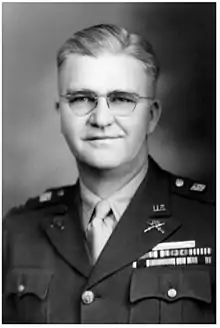 |
Sherwood Dixon | Democratic | January 10, 1949 | January 12, 1953 | Adlai E. Stevenson II | Democratic | 1949–1953 |
| 37 | .jpg.webp) |
John William Chapman | Republican | January 12, 1953 | January 9, 1961 | William G. Stratton | Republican | 1953–1961 |
| 38 | .png.webp) |
Samuel H. Shapiro | Democratic | January 9, 1961 | May 21, 1968
Succeeded Kerner |
Otto Kerner, Jr. | Democratic | 1961–1968 |
| Office vacant: May 21, 1968 – January 13, 1969 | Samuel H. Shapiro | Democratic | 1968–1969 | |||||
| 39 | _(1).jpg.webp) |
Paul Simon | Democratic | January 13, 1969 | January 8, 1973 | Richard Buell Ogilvie | Republican | 1969–1973 |
| 40 | .jpg.webp) |
Neil Hartigan | Democratic | January 8, 1973 | January 10, 1977 | Dan Walker | Democratic | 1973–1977 |
| 41 | 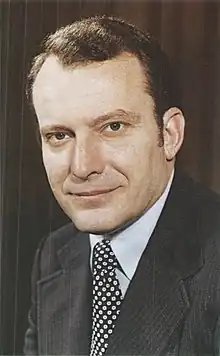 |
Dave O'Neal | Republican | January 10, 1977 | July 31, 1981
Resigned |
James R. Thompson | Republican | 1977–1991 |
| Office vacant: July 31, 1981 – January 10, 1983 | ||||||||
| 42 | .JPG.webp) |
George H. Ryan | Republican | January 10, 1983 | January 14, 1991 | |||
| 43 |  |
Bob Kustra | Republican | January 14, 1991 | July 1, 1998
Resigned |
James Edgar | Republican | 1991–1999 |
| Office vacant: July 1, 1998 – January 11, 1999 | ||||||||
| 44 | Corinne Wood | Republican | January 11, 1999 | January 13, 2003 | George H. Ryan | Republican | 1999–2003 | |
| 45 | .jpg.webp) |
Pat Quinn | Democratic | January 13, 2003 | January 29, 2009
Succeeded Blagojevich |
Rod R. Blagojevich | Democratic | 2003–2009 |
| Office vacant: January 29, 2009 – January 10, 2011 | Pat Quinn | Democratic | 2009–2015 | |||||
| 46 | .jpg.webp) |
Sheila Simon | Democratic | January 10, 2011 | January 12, 2015 | |||
| 47 | .jpg.webp) |
Evelyn Sanguinetti | Republican | January 12, 2015 | January 14, 2019 | Bruce Rauner | Republican | 2015–2019 |
| 48 | .jpg.webp) |
Juliana Stratton | Democratic | January 14, 2019 | Incumbent | J.B. Pritzker | Democratic | 2019–present |
References
- https://issuu.com/csg.publications/docs/bos_2021_issuu
- "Constitution of the State of Illinois". Illinois General Assembly. Retrieved August 22, 2019.
- "Illinois Compiled Statutes 15 ILCS 5 — Governor Succession Act". Illinois General Assembly. Retrieved August 23, 2019.
- Yeargain, T. Quinn (2021). "One Vote, Two Winners: Team-Ticket Gubernatorial Elections and the Need for Further Reform". University of Miami Law Review. 75 (3): 377–78. Retrieved October 15, 2022.
- Yeargain 2021, p. 779, 782-83, 794.
- "Governor's Rural Affairs Council". State of Illinois. Retrieved 12 October 2020.
- Hawkins, Karen (January 9, 2010). "Candidates line up for lieutenant governor ... but why?". The Pantagraph. Retrieved October 12, 2020.